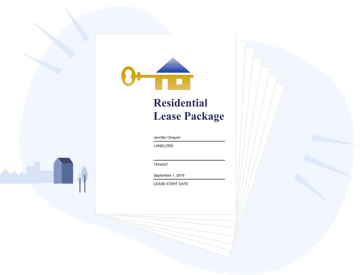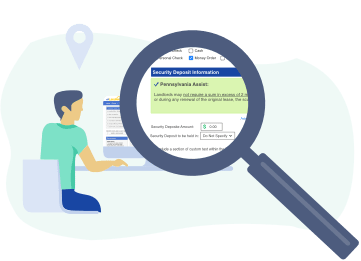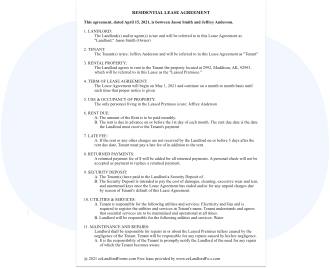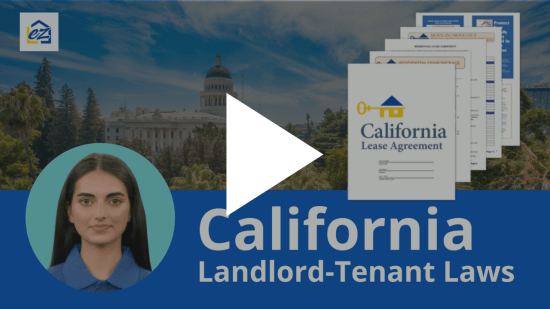California Lease Agreement with ezSign
Pro Form: Create a Pro Account to access this form
4.8 Stars
Create and Download the California Residential Lease & Rental Agreement printable PDF for Landlords. This state-specific Lease is customizable and includes CA laws.
Document Last Modified: 2/10/2025
Document Features
Uses Lease Builder
State-Specific
ezSign
Related Documents
California Law Updates for 2024: California passed two bills in 2024 that impact Landlords and Tenants. We’ve updated our site with the necessary changes. To help Landlords comply with these new requirements, here’s a summary of the 2024 changes to California Landlord-Tenant laws.
Watch Our Videos
▶ This is Why a Lease is so Important
▶ How to ezSign your Lease Agreement
Video to Share with Tenants
Pro Tip: Before signing a California Residential Lease Agreement, always complete a thorough Tenant Screening and Rental Application to ensure the Applicant is qualified and to reduce the risk of a bad outcome.
Table of Contents

- California Lease Agreement
- California Landlord-Tenant Laws
- California Required Disclosures
- CA Optional Disclosures
- When is Rent Due & Late Fees
- City and County Ordinances
- Frequently Asked Questions (FAQs)
- Other Popular Forms
- California State Specific Documents
- Lease Agreements for Neighboring States
California Lease Agreement
Before handing over possession of your rental property, you need a thorough Lease Agreement that protects you and your property. And, it needs to comply with all California Landlord-Tenant Laws.
Our CA Lease is EZ to create and GUARANTEED TO COMPLY WITH ALL CALIFORNIA LEASE LAWS
- As you build your Lease, you’ll get California State Assist tips
- We automatically include any specific language or terms required in California
- We automatically include any California required disclosure or addenda
We Provide the Highest Quality California Lease Available Online
You won’t find a better Lease Agreement online than the California ezProLease.
- A Lease Agreement that leverages the expertise of thousands of Landlords
- Recommended by Shark Tank's Barbara Corcoran
- Over 3 million Leases created since 2006
- Rated "excellent" 4.8 from 5,000+ reviews

California Landlord-Tenant Laws
The state of California has some of the most comprehensive Landlord-Tenant laws in the country.
But we make it EZ for any California Landlord to build a great Lease. When you create your California Lease, we automatically include all state-required language, disclosures, and addenda.
That said, as a Pro Landlord, we know that you want to be familiar with the Landlord-Tenant Laws of the state. So, here’s an overview of key California Landlord-Tenant Laws:
| Category | State Law |
|---|---|
| Ending and Renewing |
Month to Month: A 30-day advance written notice is required for leases that are month to month
and/or under 1 year.
Leases for 1 Year or More: 60 days advance written notice is required, subject to new California Tenant Protection (AB 1482) restrictions |
| Security Deposit |
Security Deposits Not to Exceed:
An amount equal to 2 months rent for an unfurnished property. An amount equal to 3 months for a fully furnished property. Effective July 1, 2024: security deposit may not exceed one month's rent. Security Deposits are any pre-paid deposits including, but not limited to pet and lock deposits. California law specifically allows the landlord to use a tenant's security deposit for four purposes: 1. For unpaid rent; 2. For cleaning the rental unit when the tenant moves out, but only to make the unit as clean as it was when the tenant first moved in; 3. For repair of damages, other than normal wear and tear, caused by the tenant or the tenant's guests; and 4. If the lease or rental agreement allows it, for the cost of restoring or replacing furniture, furnishings, or other items of personal property (including keys), other than because of normal wear and tear. A landlord can withhold from the security deposit only those amounts that are reasonably necessary for these purposes. The security deposit cannot be used for repairing defects that existed in the unit before the tenant moved in, for conditions caused by normal wear and tear during the current tenancy or previous tenancies, or for cleaning a rental unit that is as clean as it was when the tenant moved in. IMPORTANT: A rental agreement or lease can never state that a security deposit is "nonrefundable." Under California law, 21 calendar days or less after you move, your landlord must either: 1. Send you a full refund of your security deposit, or 2. Mail or personally deliver to you an itemized statement that lists the amounts of any deductions from your security deposit and the reasons for the deductions, together with a refund of any amounts not deducted. It is important for the landlord to follow procedures set out under the California Code for the handling of security deposits. Complete information can be found: California Guide to Residential Tenants’ And Landlords’ Rights And Responsibilities RETURN OF SECURITY ELECTRONICALLY AND STATEMENTS TO BE EMAILED PERMITTED: After the landlord and tenant mutually agree the landlord may deposit any remaining portion of the security deposit electronically to a bank account or other financial institution designated by the tenant AND parties may agree to the statement of security deposit to be emailed. California law mandates that a landlord notify a tenant in writing of the option of having an initial inspection two weeks before terminating a rental agreement or lease in order to identify problems (and possible deductions from the security deposit) and be given a chance to rectify them and avoid the deduction. Failure to do this may void the opportunity to collect for damages. It's not required to specify in the lease the maximum number of days to return the security deposit. It is optional. |
| Returned Payment Fee | Assessed charges must not exceed $25 for the first check and a service fee of up to $35 for each subsequent check to that same payee. |
| Late Fee |
Late fees should not exceed a reasonable estimate of costs incurred.
In some communities, late fees are limited by local rent control ordinances. |
| Insurance Requirements | There are no stated regulations regarding the requirement of renter's insurance in California. |
| Addenda & Disclosures |
Owner/agent must include current and clear notification of the name, telephone number, and street
address of whoever is accepting rental payments, repair requests, and all notices.
Owner/Agent MUST provide a copy of the rental agreement or lease to the tenant within 15 days of its execution by the tenant. Many required addenda included with the lease builder. |
| Notice to Enter | Reasonable prior notice is required. A twenty-four hour written notice to the tenant is considered a reasonable notice. |
| Landlord Requirements |
PROPERTIES IN FORECLOSURE
Month to Month: If a tenant is in possession of the leased premises at the time the property is foreclosed, the landlord must give the tenant a 90-day written notice to terminate under California law. Fixed Term Leases: The tenant may remain until the end of the lease term in most circumstances and all rights and obligations under the lease shall survive foreclosure, including the tenant’s obligation to pay rent. ALTHOUGH, the landlord may give a 90-day written notice to terminate a fixed-term lease after foreclosure should any of the following four situations occur (1) The purchaser or successor-in-interest will occupy the leased premises as their primary residence; (2) The tenant is the borrower or the borrower’s child, spouse, or parent; (3) The lease was not the result of an arms’ length transaction, meaning neither of the involved parties may have any interest in the transaction's consequences to the other party. (4) The lease requires rent that is substantially below fair market rent (except if under rent control or government subsidy). PLEASE NOTE: The purchaser or successor-in-interest possesses the burden of proving that one of these four exceptions has been met. IMPORTANT: This law does not apply if a borrower stays in the property as a tenant, subtenant, or occupant, or if the property is subject to just cause rent control. |
Pro Tip: It’s helpful to review the Guide to Residential Tenants’ and Landlords’ Rights and Responsibilities. It covers all state-required rules and regulations that California Landlords need to know. Review it here.
California Required Disclosures
Our CA Lease Agreement automatically includes all California required language, disclosures, and addenda. That means you don’t have to worry about required disclosures. We’ve already done all of the work.
California law requires that certain disclosures be included in Residential Rental Agreements, including:
- A Lead-Based Paint Disclosure: Required if the property was built prior to 1978.
- AB 1482 Just Cause Addendum: Must be attached and signed by Tenants and Landlords unless the property falls into one of the exemption categories. CIV § 1946.2(e) and § 1947.12(d)(5)(B)(i).
- Demolition: If a Landlord has received any type of permit to demolish a rental, it must be disclosed before accepting the security deposit or signing the Rental Agreement. CIV § 1940.6.

Take the quiz: What clauses would you include to prevent Tenant Nightmares?
CA Optional Disclosures
There are some optional disclosures that Landlords can choose to add to their Lease. This is as EZ as clicking a box to add the disclosures you want to your Lease Package.
- Asbestos Disclosure: If the unit contains or may contain asbestos, this form should be added to the Lease.
- Grilling Addendum: Provides the rules and policies governing grilling on the premises.
- Pet Addendum: To provide guidelines and policies when a Tenant has a pet on the premises.
- Pool and Hot Tub Addendum: If a hot tub, jacuzzi, or pool are on the property, this form should be used.
- Renter’s Insurance Addendum: This should be used if renter’s insurance is required
- Satellite Dish Addendum: In California, all Tenants have the right to install a satellite dish as long as it conforms with all state and local laws.
- Criminal Activity Addendum: Neither Tenants nor their guests may engage in any of the activities listed in this document - see a sample here for a list of activities. Failure to comply may result in immediate removal (eviction) from the property.
Pro Tip: Our State Assist automatically includes all state-required language and documents.
When is Rent Due & Late Fees
- Rent is due on the day specified in the California Lease Agreement.
- Rent can be paid as specified in the Lease, for example, with check, cash, electronically, Venmo, etc.
- There is no state-required "grace period"
- Late fees:There is no specified amount for late fees, but the fee should not exceed a reasonable estimate of the costs incurred due to the late payment. Note: in some places, late fees are limited by local rent control ordinances.
- Notice to Quit: If renters are late paying rent, Landlords may send a 3-day Notice to Quit, which requires them to pay the full amount due or vacate the property. If they do neither, Landlords may initiate eviction proceedings. See sample form here.

City and County Ordinances
In addition to state laws, California Landlords also have to comply with the city and county regulations where their apartments, single-family homes, condos, duplex, or other types of rental units are located.
Here are just a few examples of local ordinances you need to know:
- In San Diego, a Landlord must give "just cause" when serving a sixty (60) day notice
- Landlords in Long Beach must register their rentals with the City’s Proactive Rental Housing Inspection Program
- In Beverly Hills, a Landlord may increase rent once every 12 months, limited to 3% of the current rent or the regional Consumer Price Index (CPI), whichever is higher
- Sacramento’s Tenant Protection Ordinance limits the amount rent can be increased annually and prohibits evictions without just cause
- Los Angeles Landlords should review the Los Angeles Landlord and Tenant Handbook for Rent Stabilized Units, which can be found here

We’re proud that our thorough California Residential Lease Agreement meets all of the requirements for the cities of:
| Anaheim | Los Angeles | San Diego | San Francisco |
| Bakersfield | Long Beach | Santa Ana | San Jose |
| Fresno | Riverside | Sacramento | Stockton |

Frequently Asked Questions (FAQs)
What is a California Lease Agreement?
A California Lease Agreement is a legally binding document between a Landlord (the lessor) and a Tenant (the
lessee) that outlines all of the terms of a rental relationship. It provides all rules, policies, and terms
under which a Tenant rents property from a Landlord. Upon signing the Lease Agreement, the Tenant generally pays
a security deposit and the first month’s rent.
Who Needs a California Lease Agreement?
Anyone who rents real estate needs a California Residential Lease Agreement, whether they’re renting residential
or commercial real estate. This is true even if you’re renting to a friend or a family member.
What are the Different Types of California Lease Agreements?
At ezLandlordForms, we understand that every Landlord has unique needs. That’s why we have tools to help
Landlords build the exact Lease they need:
- Month-to-Month Rental Agreement: For California Landlords looking for a month-to-month Lease.
- Simple Rental Agreement: Our basic Lease is fillable, printable, and free. You can customize this standard Lease online, print it, and download it as a pdf (but not as a word document). Unlike other basic Leases - for example, the one offered by the California Association of Realtors - you don’t have to write in information and fill in the blank spaces with our basic rental contract. Our free Lease is customized entirely online.
- Residential Lease Agreement: All Landlords need a state-specific Agreement, but it’s especially important in California, where there are some of the most complex Lease laws in the country.
- Commercial Lease Agreement: For Landlords renting commercial, as opposed to residential, real estate.
- Sublease Agreement: For Landlords allowing Tenants to sublease a unit.
Can I Write My Own California Lease Agreement?
In theory, you can write your own Agreement, but it’s risky to do so. Your Lease needs to comply with all
California Lease laws and cover all terms and policies of your rental property. If there’s any conflict with a
Tenant or any issues with a property, it’s the Lease that will protect you.
The Lease is the most important document that Landlords use, so it’s critical that you have a great one that complies with all legal requirements and covers all terms of your rental relationship.
Does My California Lease Need to Be Notarized?
No. Your Lease must be signed by both the Landlord and Tenant but does not need to be notarized.
What Should Be Included in a California Lease?
It’s important that your California Rental Lease Agreement includes all the terms, conditions, and rules
pertaining to your rental property. A comprehensive, state-specific Agreement includes:
- Full names and contact info for Landlord, Tenants, and all occupants
- A description of the rental property
- The tenancy period
- Monthly rent amount and due dates
- Security deposit information, including amount and policies
- California-specific terms and language
- California Required documents
- Customized language for your rental, including issues like pets, guests, subletting, parking, and trash and recycling
- Disclosures and Addenda to create a complete Lease Package, for example, a Welcome Letter, a Move-In/Move-Out Checklist, and a Smoke-Free Property Addendum
Other Popular Forms
While we have the best online Lease available, that’s not all that we offer Landlords. We also have thorough Tenant Screening Services and all the forms you need for the entire Landlord Lifecycle. Soup to nuts Landlord tools, if you will.
- Rental Application: Pro Landlord tip - never hand over possession of your rental property without first having an Applicant complete a Rental Application and Tenant Screening. Thorough Tenant Screening should always include a credit report and criminal background report.
- Move-In/Move-Out Walkthrough Checklist: Use this checklist to keep track of the condition of your property and to make sure that you account for any damage caused by Tenants.
- Tenant Welcome Letter: Customize this welcome letter to provide Tenants with all the information they need about their new home from day one. Pro Landlord tip - good communication is key for a good Landlord-Tenant relationship. The Welcome Letter is a great way to make sure you have good communication from day 1.
- Rent Ledger: This form provides an EZ way for Landlords to document rent payments and ensure that all Tenants are current on rent.
California State Specific Documents
- California Security Deposit Accounting Statement: This form makes it EZ for Landlords to comply with California’s specific requirements regarding the accounting of security deposits.
- California 30-Day Notice to Vacate: This is the form Landlords need to end a month-to-month Lease or a Lease with a tenancy period of less than one year.
- California 60-Day Notice to Vacate for Non-Exempt Properties - No-Fault Just Cause Lease Termination: California Landlords can provide Tenants with a 60-day Notice for no-fault just cause evictions, which must inform Tenants of their right to receive relocation assistance.
- California Notification of Pre-Move Out Inspection: California Landlords are required to give Tenants written notification of their right to request a pre-move out inspection. This form makes it EZ to do!
- California 3-Day Notice to Pay or Quit: This form is for Tenants that are behind on rent and a necessary step prior to filing for eviction.
- California 3-Day Notice to Perform or Quit: If you have a Tenant that is breaking the Lease but the violation can be fixed, this is the form you need.
- California Notice to Reclaim Abandoned Property: If a Tenant leaves unclaimed property in a rental unit that appears to be worth more than $700, this form is required.
- California Notice of Belief of Abandonment: If a Tenant has missed at least 14 days of rent and you believe they have abandoned the property, this notice must be sent to Tenants.
- California Unlawful Detainer Complaint: This is the complaint Landlords use to officially initiate eviction proceedings. This can be used when a Tenant has violated the Lease Agreement and been served proper notice.
- California AB 1482 Rent Control & Eviction Exemption Form: California Landlords must provide Tenants with this Notice of Exemption if their property is exempt from the requirements of California AB 1482. California Accessibility and Americans with Disabilities Act: A landlord should include this form in a commercial lease to state whether or not the premises has been inspected by a Certified Access Specialist.
- California Bed Bug Addendum:California Landlords should include this in their Lease Package to comply with state bed bud disclosure requirements.
- California Death on Premises Disclosure: Use this disclosure to comply with California’s requirement of disclosing any death in the unit in the past three years.
- California Notice of Intent to Demolish: Use this disclosure to provide current and prospective Tenants with adequate notice of intent to demolish a rental unit.
- California Flood Disclosure: This form is an easy way for California Landlords to comply with required statewide flood disclosures and to give Tenants all necessary notice of flood risks.
- California Information of Dampness & Mold: California Landlords must provide Tenants with the informational booklet before entering into a Lease Agreement.
- California Methamphetamine or Fentanyl Disclosure: If a rental unit has been contaminated by methamphetamine or fentanyl or is in remediation, Landlords must disclose this to Tenants and provide them with the remediation order.
- California Ordnance Location Disclosure: If a Landlord has knowledge that a rental unit is within one mile of a former state or federal ordnance location, this must be disclosed to Tenants in the Lease Agreement.
- California Energy Disclosure: Use this form in a commercial lease to confirm that the energy consumption and benchmarking disclosure were provided to the tenant.
- California Flood Disclosure: This form is an easy way for California Landlords to comply with required statewide flood disclosures and to give Tenants all necessary notice of flood risks.
- California AB 1482: The California Tenant Protection Act requires this document, a written disclosure concerning two requirements: 1. Limits on rent increases and 2. a statement of cause in notices to terminate a tenancy.
- California Water Meter Disclosure: California Landlords that charge Tenants separately for water usage or those required to use water submeters must provide Tenants with a Water Meter Disclosure.
- Information on Dampness and Mold for Renters in California: Information on Dampness and Mold for Renters in California
- 15 Day Notice to Pay or Quit: This form provides the language required for a California Landlord to initiate eviction proceedings pursuant to CA AB 3088, including the required attachment of a Declaration of COVID-19-Related Financial Distress.
- California Guide to Residential Tenants’ And Landlords’ Rights And Responsibilities: This is the California Guide to Residential Tenants' And Landlords' Rights And Responsibilities.
- California Rental Application: This Rental Application will provide the landlord with the necessary information about the inquiring applicants, excluding the marital status question.
- California Family Daycare Q&A for Landlords: An informative guide for the landlord regarding the requirements needed for a tenant to run a home daycare in a rental property.
- California Non-Residential Building Energy Disclosure Program Information: California Landlords who rent non-residential property must comply with the California Nonresidential Building Energy Use Disclosure Program.
- California Notice of Pest Control Treatment: California Landlords are required to give renters notice any time the Landlord uses pesticides to treat a rental unit. Ours is EZ to customize & download.
- California Quitclaim Deed: This California Quitclaim Deed complies with California's legal requirements and allows owners to transfer their housing ownership to others.
- Declaration of COVID-19-Related Financial Distress: This form provides the language required for a California Landlord to initiate eviction proceedings pursuant to CA AB 3088, including the required attachment of a Declaration of COVID-19-Related Financial Distress.
Lease Agreements for Neighboring States
We know that lots of CA Landlords own rental units in nearby states. That’s why we offer state-specific Leases for every state that are guaranteed to comply with state law.
- Arizona Rental Contract: Includes all Arizona required language!
- Idaho Residential Lease Agreement: Customize this Lease and add any additional forms you need. Note: we also have short-term rental contracts for vacation homes, which are popular for many Idaho Landlords.
- Lease Agreement Nevada: Customize your Nevada Lease to create the complete Lease Package.
- Oregon Lease Contract: The Oregon Lease includes all required disclosures, including carbon monoxide and flood plain disclosures.
- UT Lease Agreement: The EZiest way to build a comprehensive Utah Lease!
- Washington Rental Lease Agreement: Like all of our state-specific Leases, our Washington Lease gives Landlords unlimited access to our electronic signing tool, ezSign.
Things to Consider Before You Hand Over Legal Possession of Your CA Property
- Have all Tenants completed a Rental Application and Tenant Screening?
- Do you have a fully executed Lease Agreement?
- Have you received the entire security deposit and first month’s rent?
Other Tools CA Landlords Love!

Unlimited access to our electronic signature tool, ezSign. With this user-friendly tool, Landlords and Tenants only need a smartphone or a computer to sign their Lease.

Your Lease is automatically stored securely on encrypted servers with ezCloudStorage. BUT, we know some Landlords like a hard copy, so it’s also printable and EZ to save as a PDF.

